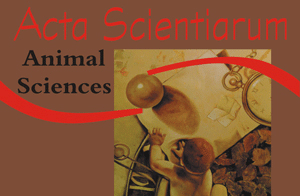ABSTRACT.
This study aimed to evaluate the intake, digestibility, and ingestive behavior of sheep fed with different species of forage cacti. Fifteen sheep (17.27kg ± 1 kg) were distributed in a completely randomized experimental design with three treatments and five replicates. The treatments were diets on a dry matter basis composed of 430.9 g kg-1 of thornless Mandacaru cactus (Cereus hildmannianus), 525.7 g kg-1 of cactus pear cv. Orelha de Elefante Mexicana (Opuntia stricta) and 492.1 g kg-1 of cactus pear cv. Miúda (Nopalea cochenillifera) in addition to Sabiá hay (Mimosa caesalpiniaefolia) (194.7 to 233.8 g kg-1), plus concentrate feed. The intake of the dry matter, organic matter, ether extract, neutral detergent fiber, total carbohydrates, non-fiber carbohydrates, total digestible nutrients and voluntary water intake in g day-1 was not differ (p > 0.05) by experimental diets. There were no differences (p > 0.05) in digestibility coefficients of the dry matter, organic matter, neutral detergent fiber, total carbohydrates, non-fiber carbohydrates, and total digestible nutrients between the experimental diets. The feeding times differed (p < 0.05) between diets, with a higher value for the Opuntia diet, while the rumination times, feeding efficiency, and rumination efficiency did not differ (p > 0.05). The cactus Cereus and Opuntia and Nopalea have similar nutritional value in sheep’s diet.
Keywords:
Cereus hildmannianus; native cacti; digestibility; strategic forage
